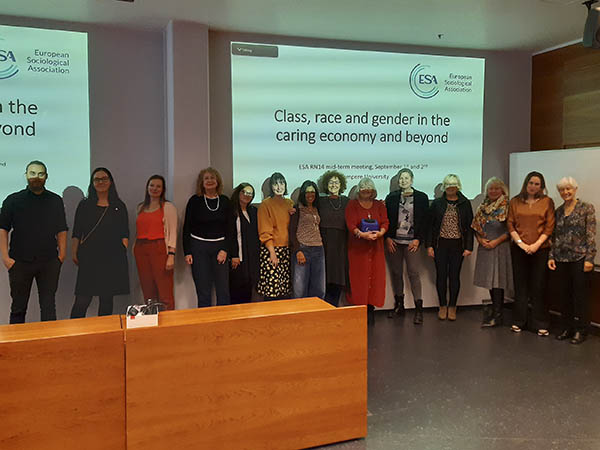Paper on social value and equality presented at conference in Finland
The Buying Social Justice project team presented its first international conference paper at the biennial meeting of the Research Network on Gender relations in the labour market and the welfare state at Tampere University, Finland in September 2022. The Network is part of the European Sociological Association, bringing together researchers interested in gender issues in employment and in welfare states from across Europe.
Project researchers Prof Hazel Conley and Prof Tessa Wright delivered a paper entitled ‘Broadening conceptions of social value in public procurement: the inclusion of gender and race inequality’ that explored the origins and meanings of the term ‘social value’, that has become a key element in the practice of public procurement, particularly in the UK. The Public Services (Social Value) Act 2012 requires public authorities in England and Wales to consider how the services they commission and procure can improve the economic, social and environmental wellbeing of the area. Yet the paper noted that the concept of social value lacks a clear definition – in the legislation, in the academic literature and in practice.
The paper argues, however, that the notion of social value can – and in some instances does – encompass measures to promote gender and race equality, as well as the disadvantage faced by other groups protected under equality legislation. Public bodies are subject to the Public Sector Equality Duty (PSED), introduced by the Equality Act 2010, that requires public authorities in England, Wales and Scotland to have ‘due regard’ to eliminating unlawful discrimination and promoting equality of opportunity in the exercise of their functions, including procurement. The General Duty applies to private companies or voluntary sector organisations contracted to carry out a public function on behalf of a public authority.
Drawing on international evidence, the paper finds examples of public procurement being adopted as a strategy to address racial and/or gender inequality in Australia, Malaysia, South Africa and the US, as well as in some European countries such as Germany and Spain. The Constitution of South Africa in 1996 adopted a provision for the preferential allocation of public contracts to disadvantaged and marginalised individuals, through a policy of Black Broad-based Economic Empowerment (BBBEE), which sought to establish a Black business-owning class in South Africa. Yet the paper suggests that there is considerable scope for public procurement to go beyond supporting black or women-owned businesses and to do more to promote employment opportunities for under-represented groups in sectors such as construction, where there may be limited opportunities for direct business ownership. The paper will be further developed for future publication.



